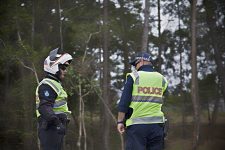What Are Police Really Spending Their Time On?

According to the Police Act 1990, the mission of the NSW Police Force is ‘to work with the community to reduce violence, crime and fear.’
The same Act says that the role of the force is to provide services for New South Wales to prevent and detect crime, protecting persons from injury or death and property from damage and providing essential services in emergencies.
Based upon this succinct statement, members of the public might be forgiven for believing that police spend most of their time chasing hardened criminals, preventing violent attacks and curbing the activities of notorious criminal gangs.
But spend a day at the Local Court and you might be surprised to find that the ‘prosecuting’ element of police work overwhelmingly relates to offences such as drug possession and traffic offences.
What Do the Statistics Say?
Local courts hear over half a million cases in Australia each year.
In the criminal law realm, the vast majority of those are traffic offences, drug possession and minor public order offences such as offensive language and offensive conduct.
An estimated 91% of all cases in Australia are heard in the Local Court or Magistrate’s Court.
In around 7% of those cases, charges are dropped before a court hearing due to insufficient evidence or other problems with the prosecution case. In many other cases, defendants are found ‘not guilty’ after all the evidence is heard.
Most who are found guilty walk away with a fine or a good behaviour bond – only 9% of them get some sort of custodial penalty, such as a suspended sentence, intensive correction order or prison.
These statistics suggest that the majority of police time is spent prosecuting people for minor offences rather than investigating serious crimes.
Police Force Annual Report
The NSW Police Force Annual Report supports this, stating that while 48% of rostered police time is spent providing ‘effective, timely and flexible 24 hour response to incidents, emergencies and public events,’ just 21% of police time is spent carrying out criminal investigations, such as crime detection, forensic services and specialist activities targeting organised crime and groups.
Administrative functions take up a further 14.8% of police hours, while judicial functions such as prosecuting defendants in the Local Court and presenting evidence or witness testimony takes up around 6% of rostered time.
Given the fact that a whopping $3.4 billion of taxpayers money was spent on funding the NSW Police Force last year alone, some might argue that more time should be spent catching ‘real’ criminals rather than concentrating on administrative duties and petty crime.
And despite the enormous resources spent on relatively trivial offences, less than 50% of people report feeling concerned about graffiti and vandalism, while only around 60% are concerned about speeding cars or dangerous drivers.
On the flip side, less than 50% of people surveyed by police said that they felt safe travelling alone on public transport, indicating that more could be done to improve public safety.
Revenue Raising and Police?
We’ve all heard the argument that speed cameras and traffic infringement notices are nothing but ‘revenue raisers,’ raking in millions of dollars each year with little public benefit.
On the other side of the fence are those who believe that traffic fines are vital to deter motorists from driving dangerously and causing car accidents.
The Office of State Revenue reports that police issued 133,915 speeding tickets in the 2014-2015 financial year.
Of these, the vast majority (75.5%) were for exceeding the speed limit by less than 20 km/h – but these relatively minor offences saw government rake in a whopping $23,800,700 from Australian motorists.
These statistics do not include camera detected speeding offences, which comprise the bulk of speeding tickets, bringing in around $89 million in a single year.
There is no doubt that speeding is a contributing factor in many car accidents, many of which have serious consequences.
But is it really worthwhile for police to spend 10% of their rostered time issuing speeding tickets for relatively minor offences?






